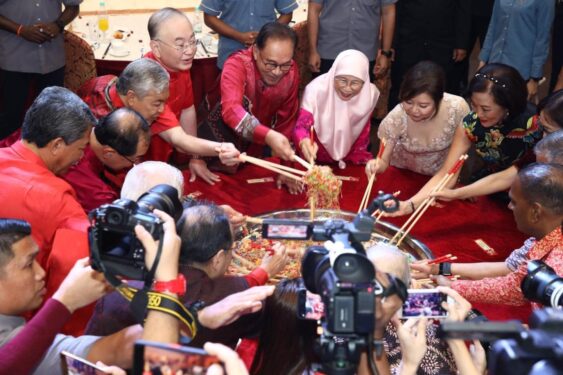AS the water rabbit hops, leaps and sprints to usher the 2023 lunar New Year, one wonders if a leadership change is imminent in the 73-year-old MCA or whether it is still able to exude its relevance as s a uni-racial political party in Malaysia that seeks to represent the Malaysian Chinese ethnicity.
Or like a veteran political observer suggests, given the diminishing support it is getting from the Chinese community these days, why not MCA just give up its stature as a political party by focusing as a socio-cultural club for the elite among the Chinese community?
Or to save all the hassle of pushing for its political longevity which often ends up as a disgrace by having to play a second fiddle to UMNO within the realm of Barisan Nasional (BN), why not MCA just focus on what it does best, ie serving as a beacon to uplift the affordability of tertiary education for the Chinese community via its Tunku Abdul Rahman University of Management and Technology (TAR UMT) project?

With the looming six state elections come June this year, it would be interesting to see how its president Datuk Seri Wee Ka Siong is able to steer MCA away from the dire straits the party is in especially as MCA has lost both its clout and respect in the eyes of modern-day Malaysian Chinese who tend to look up to DAP as their political champion.
In recent times, the table has turned against MCA for it has no Cabinet representation at all in Prime Minister Datuk Seri Anwar Ibrahim’s unity government, a clear case for DAP to further assert its influence as ‘protectors’ of the Chinese community although the latter does not position itself as a communal political party.
As pointed out by University of Tasmania’s Professor of Asian Studies James Chin, DAP has been getting more Chinese votes since the late 1990s except in the 2004 national polls whereby BN achieved its best performance, winning 90.4% of the seats.
MCA won 31 seats that year but its fortunes have dwindled. In the recently concluded 15th General Election (GE15), it only managed to win two seats – Ayer Hitam and Tanjung Pia – both of which are Malay-majority seats.
MCA is UMNO’s stooge?
Even as its association with BN has taken a toll on its reputation – bear in mind that MCA has never once officially condemned UMNO for its indulgence in the mega 1Malaysia Development Bhd (1MDB) financial scandal – Chin still reckoned the unlikelihood of MCA leave BN to join forces with other political coalitions.

“MCA leaders know they can’t survive without BN,” he told Free Malaysia Today (FMT), noting that at the same time, “MCA would have to attack DAP to remain relevant”, especially since the party did not get any Cabinet posts.
Recall that in the aftermath of the GE15, the Mersing Division MCA has urged Wee to resign from the party so as to take responsibility for the party’s miserable performance.
Its chairman Tan Ah Fatt said the GE15 result which saw MCA suffer a heavy defeat gave a clear signal that Chinese voters once again rejected MCA.
As MCA’s top leader, he said Wee was seen denying his failure in leading the party by rejecting responsibility for the defeat to BN chairman and UMNO president Datuk Seri Ahmad Zahid Hamidi.
“Wee once again showed his great skill which is to siam (literally, “avoid” in Hokkien), all the failures as having come from others while all the successes come from himself,” Tan justified in a statement on Nov 24 last year.
“Accordingly, the political party representing the Chinese in Malaysia only won two seats in 44 constituencies where the majority are not Chinese. The results were very bad. Should DS Wee also resign?”
In all earnest, the writing has been on the wall for more than two decades that more and more Malaysian Chinese have been ‘ditching’ MCA as their ‘saviour’.
As former head of MCA’s research unit Stanley Koh pointed out back in Feb 17, 2012, the symbolic relationship between MCA and the Chinese community which is akin to fish to water “is destined to become irrelevant as more and more conscientious Chinese Malaysians abandon the party at the crossroads”.
Koh’s mention of the 2008 electoral tsunami outcome is interesting given that some 3.7 million Malaysians voted against BN component parties of which the opposition DAP garnered more than one million votes against MCA’s 840,000 votes despite boasting a membership population of 1.3 million.
It was even more humiliating that DAP won many of the 25 parliamentary out of 40 seats contested by MCA.
“MCA never enjoyed the support of the Chinese-dominated constituencies in the past and this is not peculiar in the GE12,” outlined the 2008 general election’s confidential post-mortem report.
“MCA has stayed on the crossroads. Nothing much has changed despite multi-million-ringgit sloganeering, repackaging and rhetoric on transformation,” opined Koh in a column published in FMT.
“Political mindsets of the ruling regime and many decades-old issues confronting the various communities remain unchanged or outstanding like sore thumbs in a row.” – Jan 23, 2023









